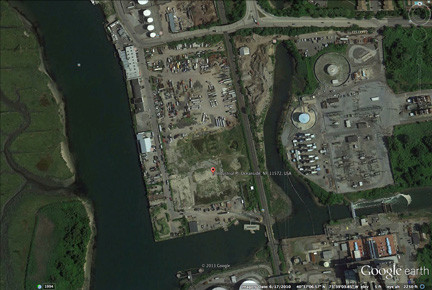State orders clean up of toxic site
Former O’side oil terminal termed ‘significant threat’
More than five years after a former Gulf Oil terminal in Oceanside was placed on the state’s Superfund toxic waste site list, the Department of Environmental Conservation has directed that an expedited cleanup begin this summer at the 7-acre site.
The DEC has chosen Chevron Environmental Management Company for the cleanup of the site, at 1 Industrial Place, in the southwest corner of Oceanside, off Lawson Boulevard, behind the Oceanside Shopping Center on Long Beach Road.
The site is categorized as Class 2 in the State Registry of Inactive Hazardous Waste Sites, meaning that it represents a
“significant threat to public health or the environment.” State law requires that action be taken to remediate such sites.
Soil and groundwater tests in previous years indicate that the soil in the western and southern portions of the site contains volatile organic compounds at concentrations above allowable levels. Groundwater contamination has been found predominantly in the northeastern, central and southern areas of the site.
The site operated from 1932 until the 1990s as a petroleum storage terminal. It held a dozen large storage tanks, three of them underground, all holding fuel oil, kerosene and gasoline, as well as a number of smaller tanks that were used to service the site and its vehicles.
Four of the large above-ground tanks were demolished before 2000, and the rest were reportedly demolished in 2003.
According to a DEC spokesman, the site has undergone extensive investigation and remediation since the late 1990s under the state’s Brownfield Cleanup Program.
In January 2007, the DEC accepted Lowe’s Home Centers Inc. offer to work in the Brownfield program, particularly in Oceanside, but the company withdrew from the program in 2009 and the DEC transferred the site to the Hazardous Waste Program, commonly known as the Superfund.
The major contaminant at the Oceanside site, a state report said, is trichloroethylene, or TCE, a man-made, chlorinated solvent used primarily to remove grease from metal parts and textiles. According to the DEC’s website, “Due to concerns about its toxicity, the use of trichloroethylene in the food and pharmaceutical industries has been banned in much of the world since the 1970s.” The website adds that groundwater contamination by TCE has become an important environmental concern.
The first task the state will undertake is to excavate the impacted soil and dispose of it in an undisclosed site in another state. Groundwater monitoring will contine until there is no longer a problem with contamination on the Oceanside site, the state agency said.
“We will continue to monitor the site, and additional cleanup activities might be necessary, depending on what we find,” the DEC spokesman said. “We will keep the public informed throughout the investigation and the cleanup of the site.”






